 |
|
 |
|
 |
|
 |
|
 |
|
 |
|
 |
|
 |
|
 |
|
 |
|
 |
|
 |
|
 |
|
 |
|
 |
|

In the past two decades, personal data has gradually become the core currency of the internet economy. Users, while enjoying free services, often inadvertently transfer data control to platforms. These platforms, through targeted advertising and data trading, have gained enormous economic benefits. With the rapid development of artificial intelligence technology, private data has become a key resource driving the AI-powered world. However, there are two significant contradictions in this ecosystem: data producers—individuals—often cannot receive economic returns; while AI researchers face challenges in acquiring high-quality datasets.
The early vision of the internet was to establish an open ecosystem where users could fully control their own data. However, with the proliferation of cloud infrastructure and the convenience of free services, platforms have gradually monopolized the management of digital identities, constructing a centralized data economy. This situation clearly deviates from the original design intent of the internet.
Today, two transformative forces are challenging the existing data monopoly: on one hand, the rapid development of AI has led to an exponential increase in the value of personal data; on the other hand, the rise of decentralized technologies provides individuals with new tools to regain control over their data. Vana is committed to leading this transformation, as the first open protocol designed for data sovereignty, ushering in a new era of the data economy.
Vana is an EVM-compatible AI public chain focused on the management and governance of user sovereign data. Its core goal is to establish a distributed network that allows users not only to own and govern the data they contribute but also to profit directly through data assetization. Vana not only empowers users with control over their data but also provides developers with compliant and high-quality data resources, creating a win-win ecosystem.
Vana utilizes private key permission management to ensure data portability and control, challenging the monopoly of centralized platforms in the Web2 era, building a decentralized data market that eliminates intermediaries and creates fair value for all participants.
For users:
- Reclaim data control and ownership, challenging the monopoly of centralized platforms in the Web2 era.
- Directly participate in the data economy, obtaining economic returns for their data contributions and sharing in the value created by AI.
- Enjoy the benefits of a self-sovereign internet and an open, fair data economy.
For developers and researchers:
- Obtain high-quality and diverse datasets, accelerating AI development and innovation.
- Participate in the vibrant data ecosystem, collaborating with data contributors and other stakeholders to drive the growth of the AI industry.
- Contribute to building a decentralized and sustainable data economy.
For the overall ecosystem:
- Shift the paradigm of personal data value realization from passive to active, empowering individuals in the digital economy.
- Challenge the centralized monopoly of the Web2 era, extending the network effects of centralized platforms and creating a fairer, more transparent, and efficient future for the data economy.
Through Vana's technology and ecological design, the realization of personal data value shifts from passive to active. Vana not only challenges the centralized monopoly of the Web2 era, extending the network effects of centralized platforms but also brings a fairer, more transparent, and efficient future to the data economy.
Unlike traditional digital assets, the economic value of data relies on controlled access. Once data is made public, its market value rapidly depreciates. Traditional blockchains, which emphasize public verification, are not suitable for handling private data. Vana successfully addresses this issue by combining private data hosting with public ownership architecture.
Vana maintains a global state network that ensures transparency in data ownership, quality verification, and revenue distribution. Its core functions include:
- Data is always encrypted and stored in secure environments or users' personal servers, with the platform programmatically controlling access permissions and ensuring that revenue is returned to data creators.
- Users can export their data, protect it with encryption, and join a data collective called DataDAO. Through these collectives, users negotiate the commercial use of data with researchers or developers, ensuring contributors receive reasonable compensation.
- Each DataDAO customizes proof of contribution based on its data type, measuring data value through the following indicators (including but not limited to): data volume, data quality, data sensitivity, and data timeliness.
- Data verification is completed by the Satya network, which consists of Trusted Execution Environments (TEEs) that can provide data quality verification while protecting privacy. Additionally, some DataDAOs use zero-knowledge proofs (zk-proofs) to further enhance privacy and security.
- When developers purchase data access, contributors receive proportional compensation through governance tokens. This mechanism ensures that data contributors can obtain continuous economic returns from data usage.
- Contributors have decision-making power and participate in the governance of data usage. The data market achieves fair pricing and improved efficiency by incentivizing high-quality data contributions.
Vana provides decentralized and highly liquid Data Liquidity Pools (DLPs). Users maintain encrypted control over their data while collectively sharing it. Through a smart contract-driven mechanism, the non
免责声明:info@kdj.com
所提供的信息并非交易建议。根据本文提供的信息进行的任何投资,kdj.com不承担任何责任。加密货币具有高波动性,强烈建议您深入研究后,谨慎投资!
如您认为本网站上使用的内容侵犯了您的版权,请立即联系我们(info@kdj.com),我们将及时删除。
-

- PI网络面临其投资者社区的反对,因为人们对透明度增长的担忧
- 2025-04-03 10:50:12
- PI网络目前正面临其投资者社区的大量评估,因为人们对透明度增长的担忧。
-

-

-

- Iotex将于4月3日在华盛顿特区领导迪瓦尔教育日
- 2025-04-03 10:45:12
- 代表将与国会议员会面,以展示分散的物理基础设施网络(DEPIN)如何将加密货币整合到现实世界中
-

- 历史数据表明,比特币的价格通常在4月平均增加12.98%。
- 2025-04-03 10:40:12
- 结果,加密货币社区经常将4月视为比特币特别有利和令人印象深刻的月份 - 有些人幽默地将其称为“ Upril”。
-

- Holo将在YouTube上托管直播
- 2025-04-03 10:40:12
- Holo将于4月10日在UTC在YouTube举办直播。该会议将提供有关最新进度和未来计划的更新。
-

- LivePeer将于4月7日举行社区电话,重点介绍其链财政部的治理,资金和战略方向。
- 2025-04-03 10:35:13
- LivePeer是一项分散的协议,利用以太坊区块链使视频处理领域民主化。
-

-

- PI网络未能列入二手列表
- 2025-04-03 10:30:12
- 当Binance列出倡议的投票开始时,该交易所已第二次转移了PI网络。




























































